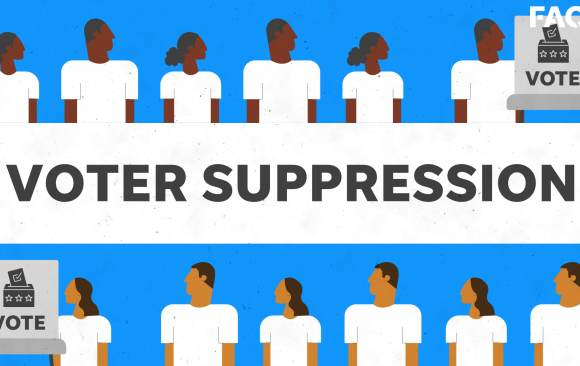


Voter suppression is the practice of employing strategies to unfairly influence elections, by preventing or discouraging people from voting. Voter suppression is carried out in many ways, including through strict voter ID laws, voter roll purges, gerrymandering, felon disenfranchisement and adding barriers to accessing the polls. Ending voter suppression is critical to defending a fair and thriving democracy.
The short answer is all of us. Our democracy is debased when the vote is not accessible for all. But the fact is that some groups are disproportionately affected by voter suppression tactics, including people of color, young people, the elderly, and people with disabilities. There’s proof that certain groups have been deliberately targeted -- for example, the government documents uncovered in the census case proved that the citizenship question intended to harm immigrants. Other times, the proof is in the numbers.
In 2013, Section 5 of the Voting Rights Act of 1965 was struck down by the Supreme Court. Section 5 required states and counties with a history of voter suppression to obtain approval by the U.S. Department of Justice before implementing any new changes to voting laws. Since section 5 has been struck down, states have acted to close polls, purge voter rolls, and implement strict ID laws and other barriers to voting without any oversight or accountability.
Support voting reform legislation that expands protections and access to voter participation. At the federal level, the Voting Rights Advancement Act H.R.4 (VRAA) and For the People Act H.R.1 (FPA) are two bills that support voting reforms. They have already passed in the House. VRAA would restore Section 5. FPA would expand and protect voting rights and reduce the influence of big money in politics.
Express your support for the Voting Rights Advancement & For the People Acts.
Register 5 people to vote in NY. Then register 5 people in a swing state!
Find your local polling center and sign up to become a poll monitor.
Register in person at your county board of elections or Department of Motor Vehicles (DMV). The deadline is October 9th, to vote in the General Elections. You can register by mail by downloading the application and sending it to your County Board of Elections.
The right to vote is the most fundamental constitutional right for good reason — democracy cannot exist without the electoral participation of citizens. We vote because it’s we, the people, who are supposed to shape our government. Not the other way around.
States can enact measures to encourage rather than suppress voting. Automatic, online, and same-day voter registration encourage participation and reduce chances of error. Early voting helps people with travel or accessibility concerns participate. And states must enforce the protections of the Voting Rights Act.
At an individual level, the best way to fight voter suppression is to vote. Here’s how to ensure your vote is protected:
Information provided by NOW and the ACLU websites.